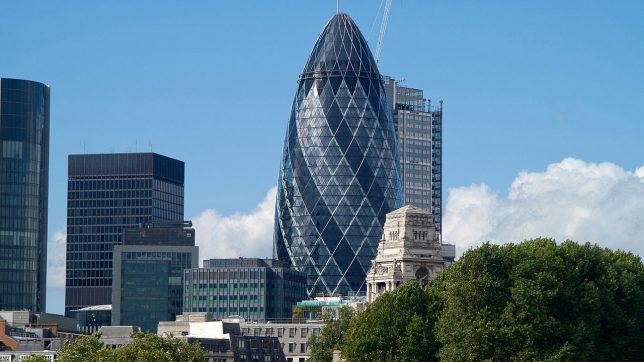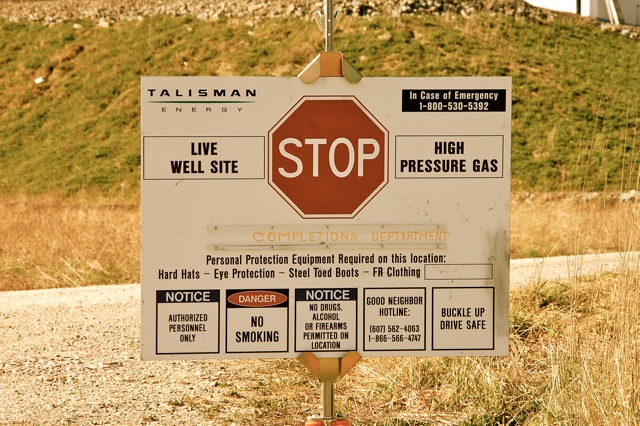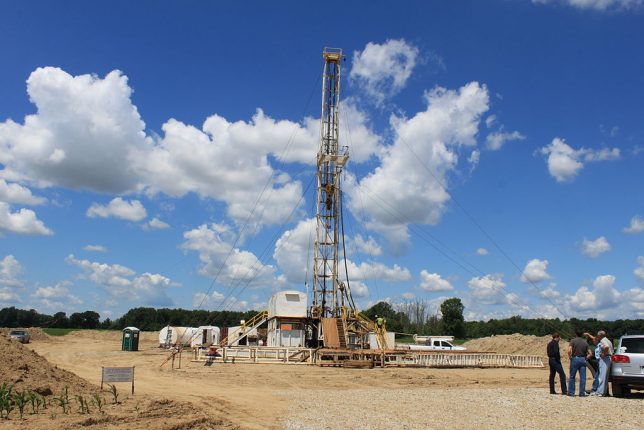
The new policy by Swiss Re “is not perfect yet,” said one campaigner, but the world’s second-largest reinsurer “is headed in the right direction.”
By Kenny Stancil, Creative Commons (CC BY-NC-ND 3.0).
After Swiss Re, the world’s second-largest reinsurer, announced Thursday that it is moving to end coverage for most new oil and gas projects, climate justice campaigners who have long pushed for the insurance industry to shift away from fossil fuels offered cautious praise.
“Swiss Re is one of the world’s ultimate risk managers and the policy which it published today sends a strong message to fossil fuel companies, investors, and governments: oil and gas operations need to be phased out in accordance with climate science or they may become uninsurable by the end of the decade,” Peter Bosshard, global coordinator of Insure Our Future, said in a statement.
According to Reuters:
In its annual sustainability report on Thursday, Swiss Re said it would no longer insure projects that get the go-ahead from their parent company from 2022, unless the company has an independently verified, science-based plan to reach net-zero emissions.
By 2025, Swiss Re said it wanted half of its overall oil and gas premiums to come from companies aligned with such a net-zero by 2050 plan, and by 2030 all its clients in the sector should have done so.
Also, from 2022, the company said it will no longer insure companies or projects with more than 10% of their production in the Arctic, apart from Norwegian producers.
On the issue of treaty reinsurance, whereby it insures bundles of risk in a job lot, Swiss Re said it expected to finalize a policy for the oil and gas sector in 2023.
“By taking steps to stop insuring new oil and gas projects and companies that won’t aim at aligning their activities with climate science by 2030, Swiss Re is headed in the right direction,” said Reclaim Finance director Lucie Pinson.
“The policy is not perfect yet,” she added, “and we encourage its peers to build on it to fully align with a realistic 1.5°C scenario.”
The International Energy Agency (IEA) said last May that there is “no need for investment in new fossil fuel supply” if the world is to achieve a net-zero energy system by 2050 en route to meeting the Paris agreement’s more ambitious global warming target.
Swiss Re, said Pinson, should respond to the IEA’s landmark report by “drawing a red line against fossil fuel expansion and excluding both projects and companies that cross that line well before 2025.”
Sharing a detailed Twitter thread by Bosshard, Oil Change International celebrated Swiss Re’s move. Becoming the first major oil and gas insurer to deny coverage for most new fossil fuel projects is “big news,” said the group.
Big news: Today @SwissRe becomes the 1st major oil and gas insurer to adopt a policy excluding insurance for most new oil and gas projects, as is necessary to stay below 1.5°C.
— Oil Change International (@PriceofOil) March 17, 2022
Get the full scoop from our friends @InsOurFuture:
Arguing that “ending support for oil and gas projects is gaining real momentum,” 350.org also praised Insure Our Future and encouraged its campaigners to “keep up the good work.”
A huge announcement from a biggy in the insurance industry. Ending support for oil & gas projects is gaining real momentum. Keep up the good work @InsOurFuture 🙌 https://t.co/xPo8jTeECe
— 350 dot org (@350) March 17, 2022
According to Bosshard, Swiss Re’s phase-out commitment represents “a first for the insurance industry” because it “not only applies to the up and midstream sectors, but also to downstream companies (oil refineries, gas utilities, petrochemical plants etc.) without credible net-zero plans.”
However, he continued, “the new policy includes some important gaps and contingencies.”
“It will not cover new production projects which oil companies move forward as part of their ongoing operations,” said Bosshard. “It also exempts Norway from its definition of Arctic oil. The IEA doesn’t make any such exemptions.”
“Most importantly, the policy hinges on the development of a credible oil and gas framework by the Science Based Targets initiative [SBTi], by which oil companies’ net-zero plans will be measured,” he added. “It’s crucial that the SBTi framework reflect the findings” of the IEA and the United Nations.
Swiss Re’s new policy follows similar policies adopted last week by Hannover Re and Mapfre, said Bosshard, who pointed out that “these three companies cover 21% of the global reinsurance market.”
“Now, the Insure Our Future campaign calls on Munich Re, Lloyd’s, and SCOR, which together account for 26% of the global reinsurance market, to make commitments which build on Swiss Re’s approach by the time of their annual general meetings,” said Bosshard.
“We’ll be watching,” he added.


